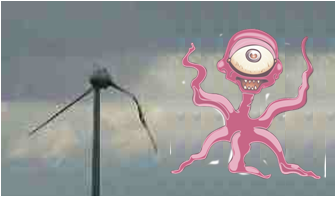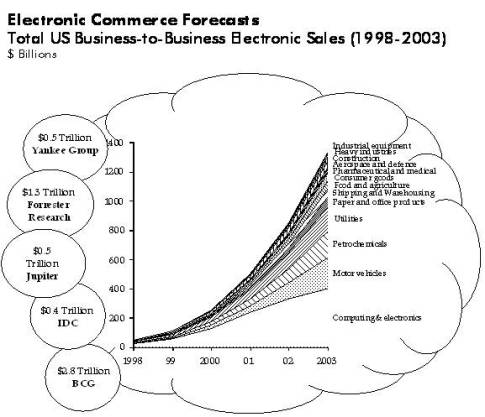Life, media-style, is normally quiet in the nether regions of Lincolnshire, but having had an earthquake last year, it seems that the papers are thirsting for more excitements from the Wolds. So we have started the year with an exciting story “Tentacled Alien Destroys Wind Farm Generator”, pictured below just after the accident (a genuine photo, for sure)…
I have commented before about the impact of global warming, but I think having an ocean-going octopus visiting now is rather premature, and in fact any, extra-terrestrial cephalopods foolish enough to embrace a windmill is going to end up as sushi.
Of course, the alien story is a good way of diverting attention from the otherwise suffocating Credit Crunch
I was going to write something clever about “interesting times” here but when looking up the origin of the phrase it turns out that the alleged curse has very little provenance – the quixotic and capricious Wikipedia suggest it might be related to the proverb “It’s better to be a dog in a peaceful time than be a man in a chaotic period” (寧 為太平犬,不做亂 世人; pinyin: níng wéi tàipíng quǎn, bù zuò luànshì rén).
Bubbles are always predictable with 20:20 hindsight, and make a nonsense of some of the great prognostications and punditry, when all comes crashing to the ground. Arthur C. Clarke summed up the dangers of prophecy as Failure of Imagination, and Failure of Nerve. To which we could probably add Failure of Intelligence to make an unholy trinity. Intelligence comes in many forms of thinking process as well as keeping a good look-out. Previous major failures of forecasting include the dot.com bust, of the prior forecasts for commercial trends were spectacularly off:
… and which also makes me think that, in the terms of control systems theory, that the whole global commercial and financial system is large and complex enough not to observable, let alone controllable (although the jury is out as to whether it is quantum indeterminate).
Which brings me to one of the classic, but flawed frameworks that are often used in the crystal-ball gazing process: the PEST analysis which attempts to scan important trends in Political, Economic, Socio-Cultural and Technological domains. Variants posited include:
-
PESTLE/PESTEL – Political, Economic, Sociological, Technological, Legal, Environmental;
-
PESTLIED – Political, Economic, Social, Technological, Legal, International, Environmental, Demographic;
-
STEEPLE – Sociodemographic, Technological, Economic, Environmental, Political, Legal, Ethical;
-
SLEPT- Social, Legal, Economic, Political, Technological
- FARM: Feudal, Agricultural, Religious, Magical (for medieval lords, thanes and serfs, etc..)
OK I made the last one up, but it demonstrates that PEST is a rather basic cookie-cutter analytical tool, and certainly not MECE in its scope. Inevitably, the framework you use for forecasting is influenced by the current frame of reference and warps the lens with which you look at and filter the trends.
In the spirit of improvement, albeit strapping wings to a pig, I can offer my own variant: PESTO. The “O” stands for “Oh sh*t”, that category of all other things that we didn’t think about in the other four categories, or plain just aren’t under the microscope, or even do not yet exist, be imagined or people don’t think can happen, and so on.
The Red Queen trumps Karl Marx – change is constant and things always move on, become different. Change is, not dialectical, sorry Karl, you backed the wrong horse.
The solutions to long term forecasting problems, is to think/work in short cycles, and react/respond quickly to keep up with the changes, and adapt to events as they arise. Be Agile!
Postscript: I cannot finish without acknowledging the death of my Uncle Edward in December, the last Gueritz of his generation, and remarkable with it. You can read his story here



